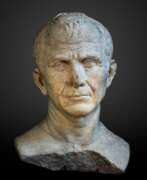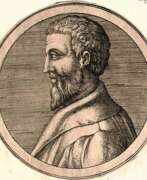Writers Ancient Rome
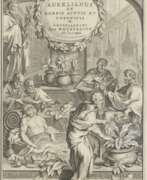

Caelius Aurelianus was a Greco-Roman physician and theorist of medicine, representative of the Methodist school, and author of treatises on medicine.
He is best known for his translation from Greek into Latin of Soranus of Ephesus' lost treatise On Acute and Chronic Diseases. The bilingual and intercultural nature of the text makes it an invaluable contribution to the study of Greco-Roman medicine.
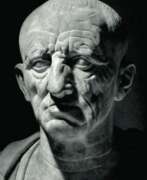

Marcus Porcius Cato the Elder, also known as Cato the Censor (Censorius), was an ancient Roman soldier, politician, historian, and writer.
Originally from a plebeian family, Cato, driven by ambition, achieved high office and held various public positions. He was also a famous orator, engaged in the improvement of Rome. Cato was an active campaigner against vice and luxury, for which he earned the nickname Censor. He was also an innovator of Roman literature, a historian, the first significant Latin prose writer, and the first author of a history of Italy in Latin.
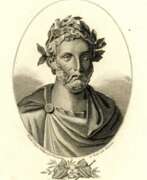

Titus Maccius Plautus, more commonly simply Plautus, was an ancient Roman playwright and comedian.
Little is known about his life, but it is believed that as a young man he worked as a stage master, stage designer, and possibly an actor. In time, Plautus went into the merchant business and, as far as is known, worked in a mill after the collapse of his enterprise. In his spare time he studied Greek dramaturgy, and by the age of forty had finally achieved success as a playwright whose comedies were the most popular dramatic works of their time.
Plautus's plays were largely borrowed from Greek works belonging to the New Comedy style. They were essentially social comedies of manners, which usually told of the domestic life of the middle and upper classes. But they also featured and played a significant role in them obliging slaves, and often young lovers, a strict father, a pimp, military men, etc. Plautus talentedly adapted Greek works for the Roman audience. Instead of exquisite Greek, Plautus deliberately used simple Latin, even street language, which was understandable to the lower classes that made up the bulk of his audience. The playwright had an excellent mastery of the art of theater and knew exactly what to include and what to change in the play to entertain the audience and at the same time not to hurt the tastes and ambitions of the upper classes.
Titus Maccius Plautus is one of the greatest playwrights of ancient Rome and was even granted Roman citizenship as a reward. Of his 130 plays have reached our time only twenty. Many great playwrights of the following centuries, including Shakespeare, based their comedies on Plautus' plots.
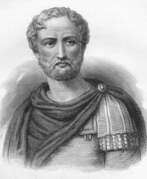

Gaius Pliny Secundus (Latin: Gaius Plinius Secundus), known as Pliny the Elder, was an ancient Roman polymath, writer and statesman.
Pliny came from a wealthy family and was educated in Rome. In military service in Germany, he rose to the rank of cavalry commander, and then returned to Rome and was appointed governor of the province. In addition to public affairs, Pliny was engaged in the study of nature, wrote various scientific works.
His book Natural History has reached our time. This is an encyclopedic work, which became an authority in Europe in scientific matters until the Middle Ages. Natural History has historical significance as one of the greatest literary monuments of classical antiquity. It is still of value to those who wish to gain an insight into first-century Rome from a primary source.
In the year 79 Pliny was appointed by Vispasian to command a fleet in the Bay of Naples, and found himself near Vesuvius at the time of its eruption. He went ashore, where he died as a result of the natural disaster.
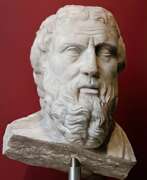

Plutarch, full Roman name Lucius Mestrius Plutarch, was an ancient Greek writer, historian and philosopher of the Roman era.
Plutarch came from a wealthy family, received a good home education, then studied in Athens with the Platonic philosopher Ammonius. In his youth he traveled a lot, twice visited Rome, where he gave public lectures, visited Alexandria, the cities of Balkan Greece. But most of his life Plutarch spent in his native Cheronea, where he was engaged in public and educational activities. At the age of about 50, he became a priest of Apollo at Delphi, as well as an honorary Athenian and Roman citizen.
Some of Plutarch's writings are devoted to various philosophical, didactic, and historical topics. These include "Moral Essays" or "Moralia", "Platonic Questions", "On Monarchy, Democracy and Oligarchy", "Instructions on State Affairs" and others. Plutarch wrote a lot of biographical works, among them "On the Fortune and Valor of Alexander the Great". The greatest popularity enjoyed "Comparative biographies", in which Plutarch recreated the images of prominent political figures of Greece and Rome. In total, 46 paired and 4 single biographies have survived.
A lot of Plutarch's publications are devoted to family and human values in general, which he considers in great detail. Plutarch's humane writings were popular during the Roman Empire, retained their importance in the Byzantine period, and with the beginning of the Renaissance became an integral part of humanistic European culture.
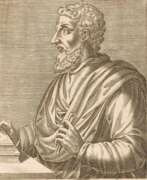

Marcus Terentius Varrō, sometimes called Varro of Reatinus, was an ancient Roman scholar-encyclopedist and writer.
Varro was a very prolific writer: the titles of his 74 works are known, totaling 620 books. Varron was engaged in logic, language, poetry, history, law and geography, history, art, history of literature, theory of music. Judging by the surviving accounts of his contemporaries, the most significant of Varron's lost works were "Divine and Human Antiquities" (Antiquitates rerum humanarum et divinarum) in 41 books and "Portraits" (Imagines) in 15 books, which contained biographies of famous Greeks and Romans, as well as 700 portraits that illustrated the text. The treatise "On Agriculture" (De re rustica) in three books has survived in complete preservation.
